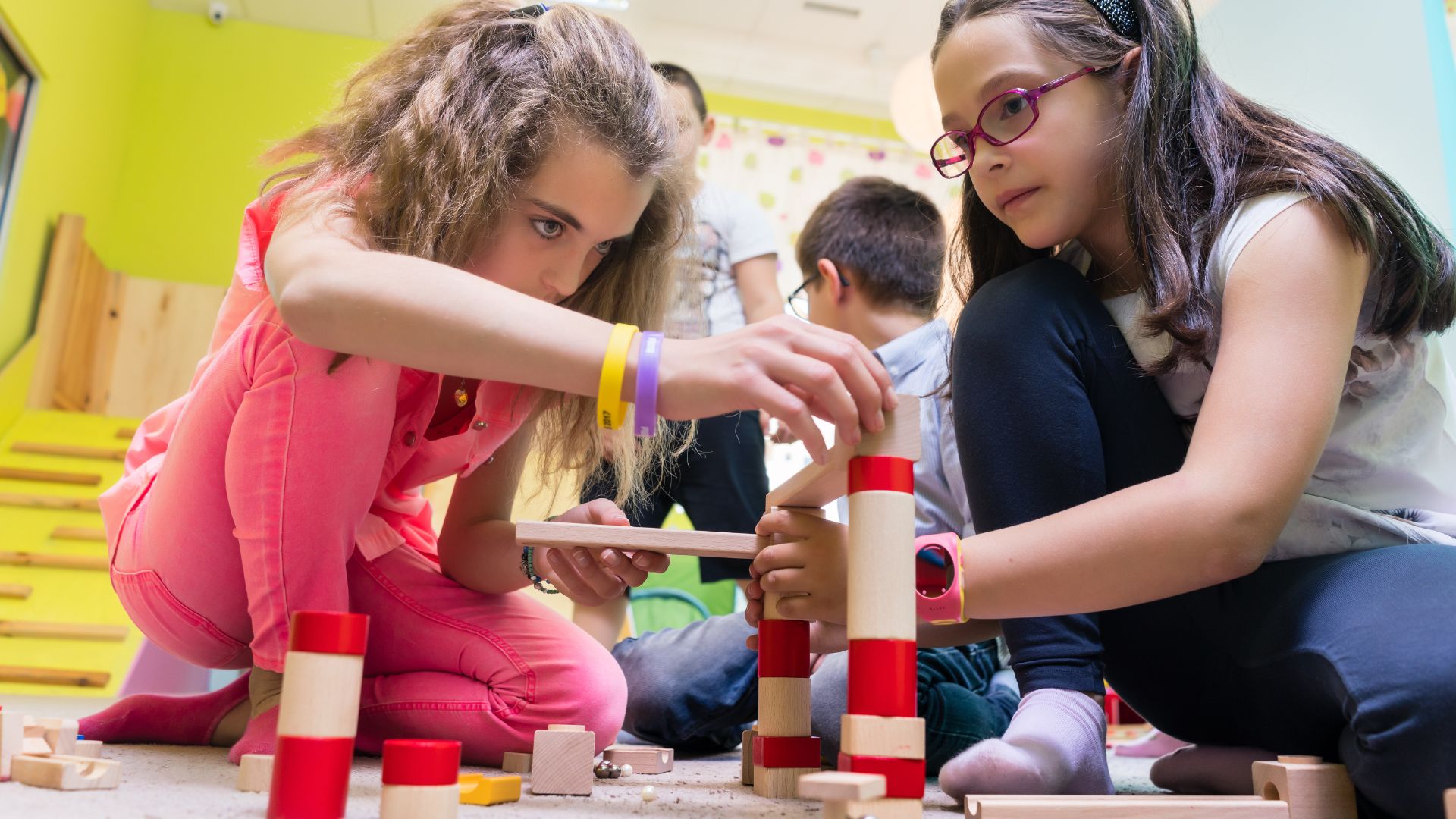8 Examples of Construction Play For Early Years
23 Aug, 20241-2 minutes
In this blog, you will learn:
- Why is it important to encourage Construction Play.
- 8 examples of Construction Play.
- Discover more about our education recruitment services.
Playing is a significant part of a child’s early development and there are various types of play that have different benefits and advantages. Construction Play is effective for developing problem-solving, fine motor skills and spatial awareness and there is plenty children can learn from taking part in Construction Play.
Throughout this blog, you’ll discover some examples of Construction Play, activities suitable for Early Years, and why it’s important to encourage creativity with Construction Play.
Why is it important to encourage Construction Play?
Encouraging Construction Play in early childhood is crucial for learning and development, and provides a foundation for growth. By engaging in these activities, children build essential skills that will serve them well in their future education and life experiences.
There are many benefits of Construction Play including skills that children and early years can develop and enhance. Most children are naturally drawn to Construction Play which makes it important for children to have the opportunity to engage with others.
8 examples of Construction Play
8 examples of Construction Play:
- Build with construction toys.
- Digging holes.
- Woodworking.
- Building sandcastles
- Playdough and clay.
- Puzzles.
- Magnetic toys.
- Cardboard construction.
Build with construction toys
Wooden blocks, lego and bricks are typical tools used in Construction Play and are a common example of Construction Play for Early Years. As the most common example of Construction Play, they are staples in every classroom. They help children to analyse the structural stability, balance and symmetry of their creations.
Children can build their own creations by stacking, rotating and joining construction equipment and learning to grasp and grip blocks, bricks and Lego. By building towers, buildings and other creations, children can help develop children’s motor skills and daily living.
By joining blocks or Lego bricks together, children develop their creativity even by repeating their actions, they can reap the benefits of constructing and experimenting with Construction Play. From developing their hand eye coordination, skill and precision, building blocks and lego are a must have with nurseries and schools.
Digging holes
Another great example of Construction Play for Early Years is to get down and dirty and do some digging! By digging ditches, holes and dams, children can have fun playing outdoors and acting like they are working on a construction site, building and demolition sites.
Children can dig into imaginary construction sites with toy construction tools such as spades and diggers. Children can dig in sand, playdough or soil using their construction tools and play on different scales (whether it be in a sandpit, in a box, or out of a tray). The different elements can give children the opportunity to explore and experience different textures.
Woodworking
Surround children with wood and natural materials to get them inspired by the natural world and incorporate woodwork into their Construction Play as well as their environment.
As long as it is in a safe and controlled environment, woodwork can be introduced to children as young as three. Woodwork gives children the opportunity to make wooden creations through wood, nails, nuts and bolts to bring their ideas to life.
Woodwork is one of the most popular activities and encourages children to develop their learning at their own pace and find their own challenges. From tinkering, exploring possibilities and making unique creations, there are many safe ways for children to be exposed to the interests of woodworking, teamwork and shared thinking.
Working with tools gives children confidence and encourages an interest or skill set for life. Later in life, they can use their confidence and skills to think about how wood practically builds something - whether it be a treehouse, a bench or a fort. Large planks of wood work well in an outdoor environment and can encourage teamwork and shared thinking.
Building sandcastles
Like building with wooden blocks, building sandcastles is an example of Constructive Play for Early Years but without the permanent creation that comes from building with blocks and bricks. With sand, children can be creative, inventive and a little messy while left to explore and discover the wonders of sand.
General sand and water play helps children understand volume, density and buoyancy while exploring different textures and elements. Early Years can build castles and forts, scoop up the sand with a shovel and even write in the sand.
Children can also learn about the short term nature of their creations as it is highly unlikely that their sandcastles will stay up overnight or by the next time they come to make something new.
The tear down process is part of the learning experience with Constructive Play which may be difficult for children to deal with or come to terms with, however it is a crucial part of the learning, development and play experience.
Playdough and clay
Construction Play involves manipulating one or more pieces of play materials to create something new, from stacking and taking things apart to moulding. Playing with modelling clay and playdough is a fun, entertaining and simple way to encourage children to consider how they mould, morph and even manipulate items to create something new.
With this type of manipulative Constructive Play, children use utensils and cutters, to roll, press and poke playdough or clay which can help to develop fine-motor skills in order to manipulate objects with control. Children use their senses of sight and touch and their imaginations to try new things.
Puzzles
Puzzles are considered to be a useful part of Construction Play as they require children to think, plan and attempt ways to successfully complete a puzzle. Children must think about all of the pieces of the puzzle and how they make up the right parts.
By thinking critically about each piece of the puzzle and actually trying different ways to make each piece fit, children can create a picture and be proud of their accomplishment.
Puzzles teach young children basic skills such as shape recognition, concentration, and patience and also improves their problem-solving skills and logical reasoning. This type of Construction Play can also help with memory retention, boost concentration levels and can provide stress relief as well as give children a sense of achievement.
Magnets
Magnetic construction toys are an engaging and educational example of play for Early Years; with their ability to attract and repel, these toys teach children about physics, cause and effect, and the properties of magnets.
Magnets can have a profound impact on early growth, learning and development. As children experiment assembling and disassembling various magnetic pieces, they are engaging in critical thinking and problem-solving. This hands-on learning experience stimulates children’s curiosity and fosters an interest in scientific concepts and principles.
Cardboard construction
Cardboard boxes are perfect for Construction Play because they can be used to make anything from a fort, to a mini model house, to a rocket ship! Cardboard boxes provide children with a flat foldable surface that can also be used to create three-dimensional shapes. All that is required is cardboard boxes, scissors and sellotape - as well as any extras such as glitter and paint!
Cardboard boxes are also a cost-effective example of Construction Play as they are easy to recycle and can easily be obtained and reused for hours of fun, entertainment and learning.
Recruit teaching staff
As a specialist education recruitment agency, we support mainstream and SEND schools with their temporary, permanent and temp-perm staffing needs.
We currently work with hundreds of schools and have exclusive access to some of the best Teachers and Teaching Assistants in the North West.
If you’re struggling to fill a teaching vacancy, why not get in touch with one of our team to see how we can help?
- Primary schools - Jimmy Callagher
- Secondary schools - Liam Jones
- SEND schools - Jamie Heath
Teaching jobs
If you’re searching for your next teaching job, why not take a look at the latest teaching vacancies, or simply upload your CV to be notified when a relevant position becomes available.
Who is Spencer Clarke Group?
Established in 2017, we’re a vibrant and progressive recruitment agency based in the heart of the North West.
We continually reimagine the recruitment process to challenge convention and defy expectations; from creating a better recruitment experience to remodelling employee engagement, we thrive off doing things differently and turning heads along the way.
We operate in two sectors:
In eleven specialisms:
Healthcare, Social Care & Nursing
Corporate Functions & Business Support





